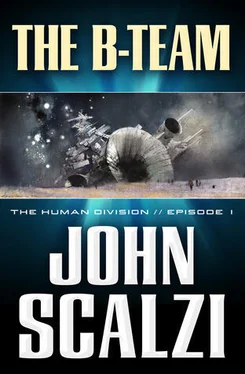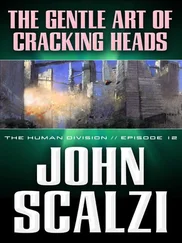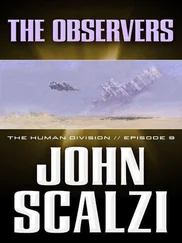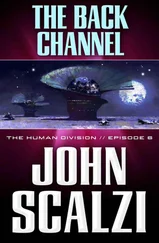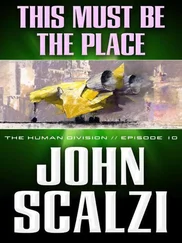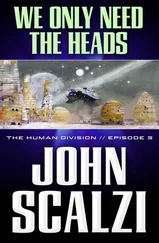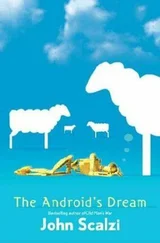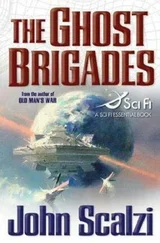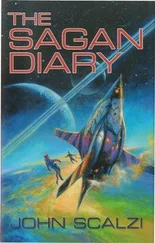John Scalzi - The B-Team
Здесь есть возможность читать онлайн «John Scalzi - The B-Team» весь текст электронной книги совершенно бесплатно (целиком полную версию без сокращений). В некоторых случаях можно слушать аудио, скачать через торрент в формате fb2 и присутствует краткое содержание. Жанр: Фантастика и фэнтези, на английском языке. Описание произведения, (предисловие) а так же отзывы посетителей доступны на портале библиотеки ЛибКат.
- Название:The B-Team
- Автор:
- Жанр:
- Год:неизвестен
- ISBN:нет данных
- Рейтинг книги:5 / 5. Голосов: 1
-
Избранное:Добавить в избранное
- Отзывы:
-
Ваша оценка:
- 100
- 1
- 2
- 3
- 4
- 5
The B-Team: краткое содержание, описание и аннотация
Предлагаем к чтению аннотацию, описание, краткое содержание или предисловие (зависит от того, что написал сам автор книги «The B-Team»). Если вы не нашли необходимую информацию о книге — напишите в комментариях, мы постараемся отыскать её.
The B-Team — читать онлайн бесплатно полную книгу (весь текст) целиком
Ниже представлен текст книги, разбитый по страницам. Система сохранения места последней прочитанной страницы, позволяет с удобством читать онлайн бесплатно книгу «The B-Team», без необходимости каждый раз заново искать на чём Вы остановились. Поставьте закладку, и сможете в любой момент перейти на страницу, на которой закончили чтение.
Интервал:
Закладка:
“Standard boilerplate about friendship between nations and species,” Wilson said. As the sole member of the Colonial Defense Forces in the diplomatic mission, he was the only one in the line able to translate Farnutian on the fly, via his BrainPal; the rest of them had relied on translators provided by the Farnutians. The only one of those present at the ceremony was now standing behind Ambassador Abumwe, whispering discreetly into her ear.
“Does it sound like he’s wrapping up?” Schmidt asked.
“Why, Hart?” Wilson glanced over to his friend. “You in a rush to get to the next part?”
Schmidt flicked his eyes toward his opposite number on the Farnutian line and said nothing.
As it turned out, Cnutdin was indeed just finishing. He did a thing with his limbs that was the Farnutian equivalent of bowing and stepped back from the podium. Ambassador Abumwe bowed and stepped toward the podium for her speech. Behind her, the translator shifted over to stand behind Cnutdin.
“I want to thank Trade Delegate Cnutdin for his stirring words about the growing friendship between our two great nations,” Abumwe began, and then launched into boilerplate of her own, her words delivered with an accent that betrayed her status as a first-generation Colonial. Her parents had emigrated from Nigeria to the Colonial planet of New Albion when Abumwe was an infant; traces of that country’s speech overlaid the New Albion rasp that reminded Wilson of the American Midwest that he had grown up in.
Not too long ago, in an attempt to start a rapport with the ambassador, Wilson had noted to Abumwe that the two of them were the only members of the Clarke crew who had been born on Earth, the rest of the crew having been Colonials all their life. Abumwe had narrowed her eyes at him, asked him what he was implying and stalked off angrily. Wilson had turned to his friend Schmidt, who was looking on with horror, and asked what he had done wrong. Schmidt told him to access a news feed.
That was how Wilson learned that the Earth and the Colonial Union appeared to be undergoing a trial separation and were probably headed for a divorce. And learned about who was splitting them apart.
Ah, well, Wilson thought, watching Abumwe wrap up her speech. Abumwe had never warmed to him; he was pretty sure she vaguely resented having any CDF presence on her ship, even in the relatively innocuous form of a technology advisor, which was Wilson’s role. But as Schmidt liked to point out, it wasn’t personal. By all indications, Abumwe had never really warmed up to anyone, ever. Some people just didn’t like people.
Not the best temperament for a diplomat, Wilson thought, not for the first time.
Abumwe stepped away from the podium, bowed deeply to Ckar Cnutdin, and at the end of her bow took her flagon and nodded to her line of diplomats. Cnutdin likewise signaled to his line.
“This is it,” Schmidt said to Wilson, and then they both stepped forward, toward the Farnutians, just as the Farnutians slid forward to them. Each line stopped roughly half a meter from the other, still parallel.
As a unit and as they had practiced, every human diplomat, Ambassador Abumwe included, thrust forward their flagon. “We exchange water,” they all said, and with ceremonial pomp upended their flagons, spilling the water at what passed for the Farnutians’ feet.
The Farnutians replied with a hurking sound that Wilson’s BrainPal translated as We exchange water, and then spewed from their mouths seawater they had stored in their bodies’ ballast bladders, directly into the faces of the human diplomats. Every human diplomat was drenched with salty, Farnutian body-temperature water.
“Thanks for that,” Wilson said to his opposite number on the Farnutian line. But the Farnutian had already turned away, making a hiccuping sound at another of its kind as it broke ranks. Wilson’s BrainPal translated the words.
Thank God that’s over, it had said. When do we get lunch?
“You’re unusually quiet,” Schmidt said to Wilson, on the shuttle ride back to the Clarke .
“I’m ruminating on my life, and karma,” Wilson said. “And what I must have done in a previous life to deserve being spit on by an alien species as part of a diplomatic ceremony.”
“It’s because the Farnutian culture is so tied to the sea,” Schmidt said. “Exchanging the waters of their homeland is a symbolic way to say their fates are now tied together.”
“It’s also an excellent way to spread the Farnutian equivalent of smallpox,” Wilson said.
“That’s why we got shots,” Schmidt said.
“I would at least like to have poured the flagon on someone’s head,” Wilson said.
“That wouldn’t have been very diplomatic,” Schmidt said.
“And spitting in our faces is?” Wilson’s voice rose slightly.
“Yes, because that’s how they cement their deals,” Schmidt said. “And they also know that when humans spit in someone’s face, or pour water on someone’s head, it doesn’t mean the same thing. So we devised something that everyone agreed was symbolically acceptable. It took our advance team three weeks to hammer that out.”
“They could have hammered out a deal where the Farnutians learn to shake hands, ” Wilson pointed out.
“We could have,” Schmidt agreed. “Except for the little fact that we need this trade alliance a lot more than they do, so we have to play by their rules. It’s why the negotiations are on Farnut. It’s why Ambassador Abumwe accepted a deal that’s a short-term loser. It’s why we stood there and got spit on and said thank you.”
Wilson looked toward the forward part of the shuttle, where the ambassador sat with her top aides. Schmidt didn’t rate inclusion; Wilson certainly didn’t. They sat in the back, in the cheap seats. “She got a bad deal?” he asked.
“She was told to get a bad deal,” Schmidt said, looking toward the ambassador as well. “That defense shielding you trained their people on? We traded it for agricultural products. We traded it for fruit. We don’t need their fruit. We can’t eat their fruit. We’re probably going to end up taking everything they give us and stewing it down to ethanol or something pointless like that.”
“Then why did we make the deal?” Wilson asked.
“We were told to think of it as a ‘loss leader,’” Schmidt said. “Something that gets the Farnutians through the door so we can make better deals later.”
“Fantastic,” Wilson said. “I can look forward to getting spit on again.”
“No,” Schmidt said, and settled back into his chair. “It’s not us that will be coming back.”
“Oh, right,” Wilson said. “You get all the crappy diplomatic missions, and once you’ve done the scut work, someone else comes in for the glory.”
“You say it like you’re skeptical,” Schmidt said to Wilson. “Come on, Harry. You’ve been with us long enough now. You’ve seen what happens to us. The missions we get are either low-level or ones where if they fail, it’ll be easy enough to blame it on us, rather than our orders.”
“Which kind was this one?” Wilson asked.
“Both,” Schmidt said. “And so is the next one.”
“This brings me back to my question about my karma,” Wilson said.
“You probably set kittens on fire,” Schmidt said. “And the rest of us were probably there with you, with skewers.”
“When I joined the CDF we probably would have just shot the hell out of the Farnutians until they gave us what we wanted,” Wilson said.
“Ah, the good old days,” Schmidt said sarcastically, and then shrugged. “That was then. This is now. We’ve lost the Earth, Harry. Now we have to learn to deal with it.”
Читать дальшеИнтервал:
Закладка:
Похожие книги на «The B-Team»
Представляем Вашему вниманию похожие книги на «The B-Team» списком для выбора. Мы отобрали схожую по названию и смыслу литературу в надежде предоставить читателям больше вариантов отыскать новые, интересные, ещё непрочитанные произведения.
Обсуждение, отзывы о книге «The B-Team» и просто собственные мнения читателей. Оставьте ваши комментарии, напишите, что Вы думаете о произведении, его смысле или главных героях. Укажите что конкретно понравилось, а что нет, и почему Вы так считаете.
